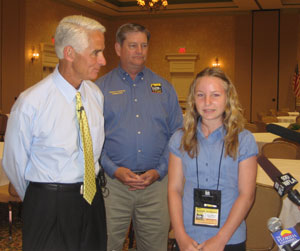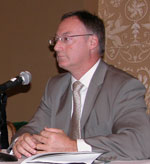 The Renewable Fuels Association is pleased with support for biofuels in the 2007 Farm Bill passed by the House Agriculture Committee last week.
The Renewable Fuels Association is pleased with support for biofuels in the 2007 Farm Bill passed by the House Agriculture Committee last week.
RFA President Bob Dinneen says the programs included in the Energy Title of H.R. 2419 will greatly contribute to ensuring America’s future energy security.
“The programs included in the Energy Title will promote Federal procurement of biobased products, provide loan guarantees for biorefineries and biofuels production facilities, expand research to better utilize ethanol co-products such as distillers grains, study the feasibility of a dedicated ethanol pipeline, and continue the Bioenergy Program to incentivize cellulosic and biomass feedstocks for ethanol production and energy production of ethanol plants,” said Dinneen.
“The RFA thanks the Committee for recognizing the potential of biofuels and providing the agriculture community, through H.R. 2419’s Energy Title, a pathway that will provide a more stable and sustainable energy future for all Americans. The RFA applauds the Committee for their work on this carefully balanced legislation, and we look forward to working with you as H.R. 2419 comes to the floor of the House of Representatives later this week.”


 The Consumer Federation of America, a consumer watchdog group, says big oil companies are trying to stop the growth of the ethanol industry… and Big Oil is using consumers’ pocketbooks in the fight.
The Consumer Federation of America, a consumer watchdog group, says big oil companies are trying to stop the growth of the ethanol industry… and Big Oil is using consumers’ pocketbooks in the fight. Add Sen. Hillary Rodham Clinton to the list of folks who suddenly seem to be a friend of ethanol. Just like in
Add Sen. Hillary Rodham Clinton to the list of folks who suddenly seem to be a friend of ethanol. Just like in  The National Biodiesel Board today called for passage of the U.S. House’s version of the Farm Bill – H.R. 2419, the Farm, Nutrition, and Bioenergy Act of 2007 – especially the parts referring to biodiesel.
The National Biodiesel Board today called for passage of the U.S. House’s version of the Farm Bill – H.R. 2419, the Farm, Nutrition, and Bioenergy Act of 2007 – especially the parts referring to biodiesel.  “The NBB believes these energy initiatives are critical in continuing to make biodiesel an important part of a diverse energy portfolio,” said Joe Jobe, NBB CEO. “As the bill moves forward, we will continue to work with our partners in Congress to ensure that necessary funding is provided for these programs, and that the Bioenergy Program is ultimately structured in a manner that will best help the U.S. biodiesel industry reduce America’s reliance on foreign oil.”
“The NBB believes these energy initiatives are critical in continuing to make biodiesel an important part of a diverse energy portfolio,” said Joe Jobe, NBB CEO. “As the bill moves forward, we will continue to work with our partners in Congress to ensure that necessary funding is provided for these programs, and that the Bioenergy Program is ultimately structured in a manner that will best help the U.S. biodiesel industry reduce America’s reliance on foreign oil.” A middle school student from Merritt Island was in the spotlight at the 2007 Florida Farm to Fuel Summit last week in St. Petersburg for her work in making biofuels.
A middle school student from Merritt Island was in the spotlight at the 2007 Florida Farm to Fuel Summit last week in St. Petersburg for her work in making biofuels. The main focus of the Florida Farm to Fuel Summit in St. Petersburg last week was getting biofuels production going in the Sunshine State.
The main focus of the Florida Farm to Fuel Summit in St. Petersburg last week was getting biofuels production going in the Sunshine State. “We have the only existing fuel ethanol plant in Florida,” said Banks. “With an aim of being up and running by the summer of 2008. For that, we need about four million bushels of something.”
“We have the only existing fuel ethanol plant in Florida,” said Banks. “With an aim of being up and running by the summer of 2008. For that, we need about four million bushels of something.” “In the longer term, in my judgment, the fuel of the future is going to be hydrogen,” Dorgan said. “I’m a big fan of the biofuels, I’m a big fan of ethanol, I believe it’s enormously important that we’ve invested in wind energy. But I believe —especially in the longer term — our grandkids need to be driving vehicles that put water vapor out the tailpipe and have twice the efficiency of power to the wheel. That comes with hydrogen fuel cells. It allows us to say to the Saudis and the Kuwaitis and others, ‘We don’t need your oil.’”
“In the longer term, in my judgment, the fuel of the future is going to be hydrogen,” Dorgan said. “I’m a big fan of the biofuels, I’m a big fan of ethanol, I believe it’s enormously important that we’ve invested in wind energy. But I believe —especially in the longer term — our grandkids need to be driving vehicles that put water vapor out the tailpipe and have twice the efficiency of power to the wheel. That comes with hydrogen fuel cells. It allows us to say to the Saudis and the Kuwaitis and others, ‘We don’t need your oil.’” Marathon Oil Company is now pumping biodiesel at two of its terminals in Illinois.
Marathon Oil Company is now pumping biodiesel at two of its terminals in Illinois. VeraSun Energy will hold a grand opening ceremony for its 110 million-gallon-a-year ethanol plant at Charles City, Iowa on August 17th, 2007.
VeraSun Energy will hold a grand opening ceremony for its 110 million-gallon-a-year ethanol plant at Charles City, Iowa on August 17th, 2007.

